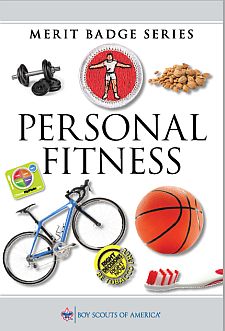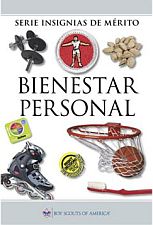This Merit Badge is Required
to earn the Eagle Scout Rank
For requirement 1 you can click on the following
link to get a copy of the New, Simplified Annual Health and Medical Record
The new form has replaced all previous versions and the former Class 1,
2, and 3 Personal Health and Medical Record Forms.
It is designed to be filled in and saved on your local computer and then
printed out on 8 1/2" x 11" sheets.
Click Here to download the Annual Health and Medical Record Form
NOTE: If meeting any of the requirements for this merit badge is against the Scout's religious convictions, the requirement does not have to be done if the Scout's parents and the proper religious advisors state in writing that to do so would be against religious convictions. The Scout's parents must also accept full responsibility for anything that might happen because of this exemption.
- Do the following:
- Before completing requirements 2 through 9, have your health-care
practitioner give you a physical examination, using the Scout medical
examination form. Explain the following:
- Why physical exams are important
- Why preventive habits (such as exercising regularly) are important in maintaining good health, and how the use of tobacco products, alcohol, and other harmful substances can negatively affect our personal fitness
- Diseases that can be prevented and how
- The seven warning signs of cancer
- The youth risk factors that affect cardiovascular health in adulthood.
- Have a dental examination . Get a statement saying that your teeth have been checked and cared for. Tell how to care for your teeth.
- Before completing requirements 2 through 9, have your health-care
practitioner give you a physical examination, using the Scout medical
examination form. Explain the following:
- Explain to your merit badge counselor verbally or in writing what
personal fitness means to you, including
- Components of personal fitness.
- Reasons for being fit in all components.
- What it means to be mentally healthy.
- What it means to be physically healthy and fit.
- What it means to be socially healthy. Discuss your activity in the areas of healthy social fitness.
- What you can do to prevent social, emotional, or mental problems.
- With your counselor, answer and discuss the following questions:
- Are you free from all curable diseases? Are you living in such a way that your risk of preventable diseases is minimized?
- Are you immunized and vaccinated according to the advice of your health-care provider?
- Do you understand the meaning of a nutritious diet and know why it is important for you? Does your diet include foods from all food groups?
- Are your body weight and composition what you would like them to be, and do you know how to modify them safely through exercise, diet, and lifestyle?
- Do you carry out daily activities without noticeable effort? Do you have extra energy for other activities?
- Are you free from habits relating to poor nutrition and the use of alcohol, tobacco, drugs, and other practices that could be harmful to your health?
- Do you participate in a regular exercise program or recreational activities?
- Do you sleep well at night and wake up feeling ready to start the new day?
- Are you actively involved in the religious organization of your choice, and do you participate in its youth activities?
- Do you spend quality time with your family and friends in social and recreational activities?
- Do you support family activities and efforts to maintain a good home life?
- Explain the following about physical fitness:
- The components of physical fitness
- Your weakest and strongest component of physical fitness
- The need to have a balance in all five components of physical fitness
- How a program like ScoutStrong can lead to lifelong healthful habits
- How the components of personal fitness relate to the Scout Law and Scout Oath
- Explain the following about nutrition:
- The importance of good nutrition
- What good nutrition means to you
- How good nutrition is related to the other components of personal fitness
- The three components of a sound weight (fat) control program
- Before doing requirements 7 and 8, complete the aerobic fitness, flexibility, and muscular strength tests, along with the body composition evaluation as described in the Personal Fitness merit badge pamphlet. Record your results and identify those areas where you feel you need to improve.
- Outline a comprehensive 12-week physical fitness program using the results of your fitness tests. Be sure your program incorporates the endurance, intensity, and warm-up guidelines discussed in the Personal Fitness merit badge pamphlet. Before beginning your exercises, have the program approved by your counselor and parents.
- Complete the physical fitness program you outlined in requirement 7. Keep a log of your fitness program activity (how long you exercised; how far you ran, swam, or biked; how many exercise repetitions you completed; your exercise heart rate; etc.). Repeat the aerobic fitness, muscular strength, and flexibility tests every two weeks and record your results. After the 12th week, repeat all of the required activities in each of the three test categories, record your results, and show improvement in each one. For the body composition evaluation, compare and analyze your preprogram and postprogram body composition measurements. Discuss the meaning and benefit of your experience, and describe your long-term plans regarding your personal fitness.
- Find out about three career opportunities in personal fitness. Pick one and find out the education, training, and experience required for this profession. Discuss what you learned with your counselor, and explain why this profession might interest you.
The requirements for the Flexibility, Aerobic Fitness, and Strength tests and for the Body Composition Evaluation which involves a calculation of the BMI percentile, which are all specified in requirements 6 and 8, are defined in the current Personal Fitness merit badge pamphlet. However, The Boy Scout Requirements booklet has different wording (unchanged from earlier requirements) for requirements 6 and 8 than what appears in the merit badge pamphlet. The text for requirements 6 and 8, above, is as the requirements appear in the Personal Fitness merit badge pamphlet.
The wording of requirements 6 and 8 in the Boy Scout Requirements book is as follows:
- Before doing requirements 7 and 8, complete the aerobic fitness, flexibility, muscular strength, and body composition tests as described in the Personal Fitness merit badge pamphlet. Record your results and identify those areas where you feel you need to improve.
- Complete the physical fitness program you outlined in requirement 7. Keep a log of your fitness program activity (how long you exercised; how far you ran, swam, or biked; how many exercise repetitions you completed; your exercise heart rate; etc.). Repeat the aerobic fitness, muscular strength, and flexibility tests every two weeks and record your results. After the 12th week, repeat the three tests, record your results, and show improvement in each one. For the body composition test, compare and analyze your preprogram and postprogram body composition measurements. Discuss the meaning and benefit of your experience, and describe your long-term plans regarding your personal fitness.
Physical Fitness Tests specified for requirements 6 and 8 are as follows:
- Aerobic Fitness Test
Record your performance on one of the following tests:- Run/walk as far as you can as fast as you can in nine minutes
OR - Run/walk one mile as fast as you can
- Run/walk as far as you can as fast as you can in nine minutes
- Flexibility Test
Using a sit-and-reach box constructed according to specifications in this merit badge pamphlet, make four repetitions and record the fourth reach. This last reach must be held steady for 15 seconds to qualify. (Remember to keep your knees down.) - Strength Tests
You must do the sit-ups exercise and one other (either push-ups or pull-ups). You may also do all three for extra experience and benefit.- Sit-ups. Record the number of sit-ups done correctly in 60 seconds. The sit-ups must be done in the form explained and illustrated in the merit badge pamphlet.
- Pull-ups. Record the total number of pull-ups completed correctly in 60 seconds. Be consistent with the procedures presented in the merit badge pamphlet.
- Push-ups. Record the total number of push-ups completed correctly in 60 seconds. Be consistent with the procedures presented in the merit badge pamphlet.
Sit and Reach Box for the Flexibility Test:
To see instructions for building the Sit and Reach Box,
Click here.
The illustration shows dimensions for constructing the reach box in inches,
while the requirement table in the pamphlet stipulates measuring the Scout's
reach in centimeters (cm). Either attach a tape measure calibrated in both
inches and cm to the top panel, or mark the top panel in cm. The measuring
scale should extend from 0 at the front edge of top panel to 53 cm at a
point 0.34 cm before the back edge. That should place the 23 cm point 0.14
cm behind the face of the foot panel.
Body Composition Evaluation (Calculating Your BMI):
- Step 1 - Multiply your weight in pounds by 703.
- Step 2 - Divide the figure you get in No. 1 above by your height in inches.
- Step 3 - Divide the figure you get in No. 2 above by your height in inches to get your BMI.
- Step 4 - Use the chart in the Personal Fitness merit badge pamphlet to determine the BMI percentile for your age.
As an example, if you are 15 years old, your weight is 130 pounds, and your height is 5'8" (68"), then:
- 130 x 703 = 91390
- 91390 / 68 = 1344
- 1344 / 68 = 20.
This means your BMI is 20. From the chart in the pamphlet, you are at the 50th percentile.
BSA Advancement ID#:
10
Requirements last updated in:
2018
Pamphlet Stock Number:
35927
Pamphlet SKU Number:
635912
Pamphlet Revision Date:
2016
|
|||||||
Page updated on: May 08, 2022










